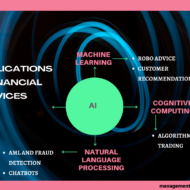Posted by Managementguru in Artificial Intelligence, Financial Management, Technology
on Sep 8th, 2020 | 0 comments

Artificial Intelligence (AI) is transforming industries across the board, and financial companies and institutions are moving fast to keep pace. AI is changing the way we apply for loans, file insurance claims, invest our money, and interact with our banks. Here are some of the most prominent AI trends that are making inroads in the finance industry. Fraud Detection and Management As e-commerce is rising in popularity, so is online fraud. To prevent frauds, many e-commerce platforms and card issuers have been forced to decline transactions too aggressively. According to a study by Javelin Strategy, retailers lost almost $118 billion in 2015 due to false declines. Moreover, more than a third of cardholders abandoned their card because it was falsely declined. To detect fraud and prevent loss of revenue, many financial institutions have turned to AI. Machine learning algorithms can reduce false declines and improve the accuracy of real-time approvals because they can identify fraudulent activities that would go unnoticed by humans. Recently, Mastercard has launched its own AI-based fraud prevention system. Mastercard’s technology gleans patterns from the historical spending habits of shoppers. It uses this data to set a behavior baseline that allows it to score and compare new transactions. It is not limited to predetermined rules. Traditional fraud detection systems, on the other hand, use a one-size-fits-all approach when evaluating transactions. Since Mastercard processes countless interactions each year, they have plenty of quality data they can use to hone and train its AI fraud prevention system. Thanks to machine learning, AI fraud detection systems learn on their own and improve themselves over time. AI systems can also automate AML (Anti-Money Laundering) and KYC (Know Your Customer) compliance. Virtual Assistants and Chatbots Thanks to machine learning and natural language processing (NLP), chatbots and virtual assistants can deliver human-like interactions. There are more and more virtual assistants that are designed for various niches within the finance industry. Banks and other institutions use virtual assistants and chatbots to offer personalized conversational experiences to their clients. Unlike human agents, virtual assistants can juggle multiple accounts at once, and they are always available. They allow customers to get assistance outside of office hours. Banks, brokerage firms, and insurance companies can use chatbots to reduce the workload of their call centers. By offerings comprehensive self-help solutions, clients can successfully apply for loans, get personalized financial tips, or file claims much faster. For instance, the AI Insurance Claims Assistant can help and re-engage with customers throughout the complete claims process. It can gather the required information for processing and update the customers on the status of their claims. They also have digital workers that can automate the onboarding journey, help customers figure out their coverage needs, update their information, or make policy adjustments. Banking bots, on the other hand, can help customers optimize their financial plan by intelligently tracking their income, spending habits, and essential recurring expenses. They can also help customers open an account and remind them to pay their bills. Risk Assessments As mentioned, one of the strongest features of AI is its ability to learn from past data. Since records and bookkeeping are an essential part of financial services, AI and finance go hand in hand. Credit cards are a perfect example. To determine if someone is eligible for a credit card, card issuers use credit score. But, business-wise, it doesn’t always make sense to group customers into “haves” and “have-nots.” Instead, financial institutions can use each customer’s data, such as the number of credit cards they have, the number of loans currently active, and information on loan repayment habits, to customize the interest rate on the card they have issued...


